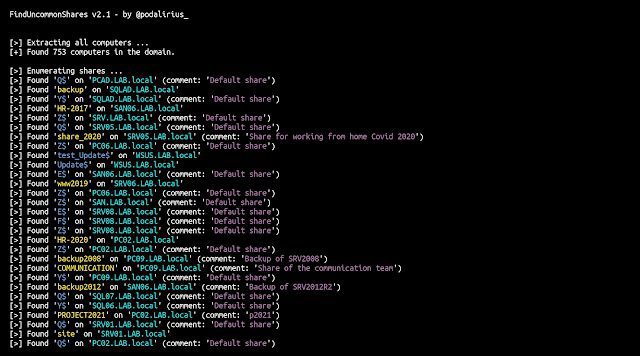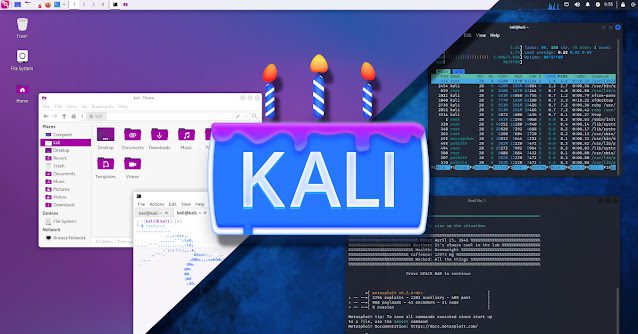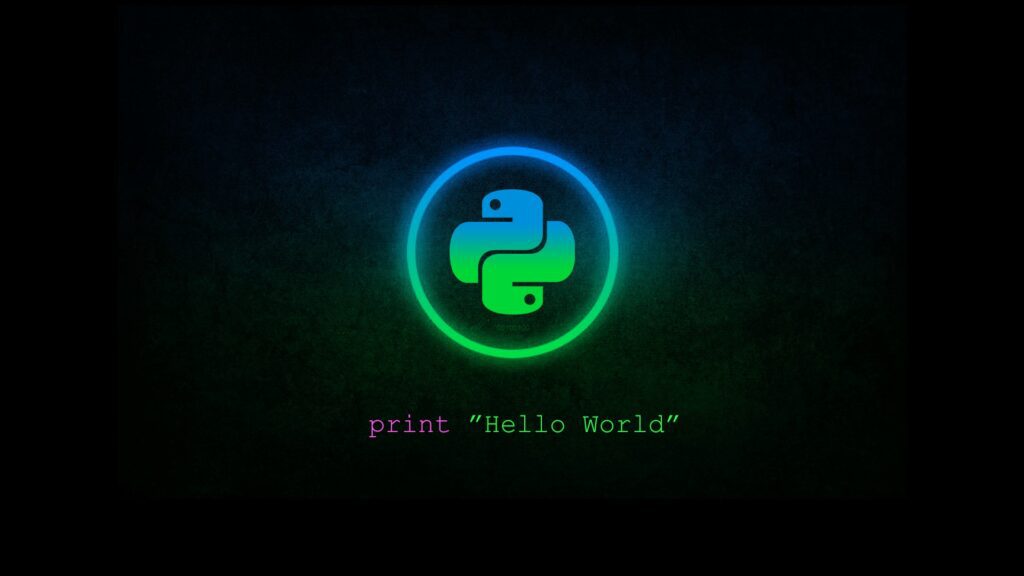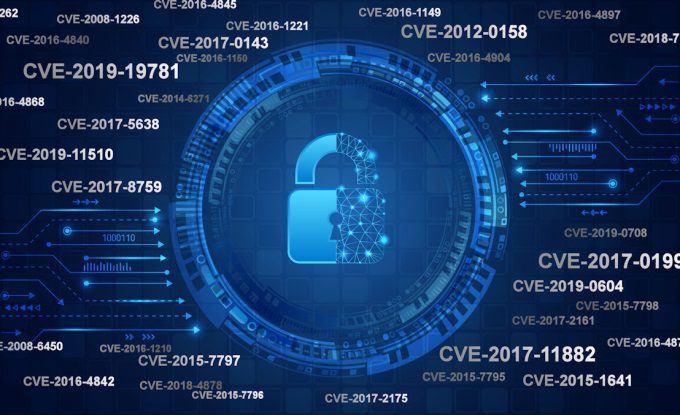The script Find Uncommon Shares.py is a Python equivalent of Power View Invoke-ShareFinder.ps1 allowing to quickly find uncommon shares in vast Windows Active Directory Domains.
Active Directory (AD) is a directory service developed by Microsoft for Windows domain networks. It is included in most Windows Server operating systems as a set of processes and services.[1][2] Initially, Active Directory was used only for centralized domain management. However, Active Directory eventually became an umbrella title for a broad range of directory-based identity-related services.[3]
Domain controller authenticates and authorizes all users and computers in a Windows domain type network, assigning and enforcing security policies for all computers, and installing or updating software. For example, when a user logs into a computer that is part of a Windows domain, Active Directory checks the submitted username and password and determines whether the user is a system administrator or normal user.[4] Also, it allows management and storage of information, provides authentication and authorization mechanisms and establishes a framework to deploy other related services: Certificate Services, Active Directory Federation Services, Lightweight Directory Services, and Rights Management Services.[5]
Active Directory uses Lightweight Directory Access Protocol (LDAP) versions 2 and 3, Microsoft’s version of Kerberos,[6] and DNS.[7]
Robert R. King defined it in the following way:[8]
“A domain represents a database. That database holds records about network services-things like computers, users, groups and other things that use, support, or exist on a network. The domain database is, in effect, Active Directory.”
Features
- Only requires a low privileges domain user account.
- Automatically gets the list of all computers from the domain controller’s LDAP.
- Ignore the hidden shares (ending with
$) with--ignore-hidden-shares. - Multithreaded connections to discover SMB shares.
- Export results in JSON with IP, name, comment, flags and UNC path with
--export-json <file.json>. - Export results in XLSX with IP, name, comment, flags and UNC path with
--export-xlsx <file.xlsx>. - Export results in SQLITE3 with IP, name, comment, flags and UNC path with
--export-sqlite <file.db>. - Iterate on LDAP result pages to get every computer of the domain, no matter the size.
Usage
$ ./FindUncommonShares.py -h
FindUncommonShares v2.4 - by @podalirius_
usage: FindUncommonShares.py [-h] [--use-ldaps] [-q] [--debug] [-no-colors] [-I] [-t THREADS] [--export-xlsx EXPORT_XLSX] [--export-json EXPORT_JSON] [--export-sqlite EXPORT_SQLITE] --dc-ip ip address [-d DOMAIN] [-u USER]
[--no-pass | -p PASSWORD | -H [LMHASH:]NTHASH | --aes-key hex key] [-k]
Find uncommon SMB shares on remote machines.
optional arguments:
-h, --help show this help message and exit
--use-ldaps Use LDAPS instead of LDAP
-q, --quiet Show no information at all.
--debug Debug mode.
-no-colors Disables colored output mode
-I, --ignore-hidden-shares
Ignores hidden shares (shares ending with $)
-t THREADS, --threads THREADS
Number of threads (default: 20)
Output fi les:
--export-xlsx EXPORT_XLSX
Output XLSX file to store the results in.
--export-json EXPORT_JSON
Output JSON file to store the results in.
--export-sqlite EXPORT_SQLITE
Output SQLITE3 file to store the results in.
Authentication & connection:
--dc-ip ip address IP Address of the domain controller or KDC (Key Distribution Center) for Kerberos. If omitted it will use the domain part (FQDN) specified in the identity parameter
-d DOMAIN, --domain DOMAIN
(FQDN) domain to authenticate to
-u USER, --user USER user to authenticate with
Credentials:
--no-pass Don't ask for password (useful for -k)
-p PASSWORD, --password PASSWORD
Password to authenticate w ith
-H [LMHASH:]NTHASH, --hashes [LMHASH:]NTHASH
NT/LM hashes, format is LMhash:NThash
--aes-key hex key AES key to use for Kerberos Authentication (128 or 256 bits)
-k, --kerberos Use Kerberos authentication. Grabs credentials from .ccache file (KRB5CCNAME) based on target parameters. If valid credentials cannot be found, it will use the ones specified in the command line
Examples :
$ ./FindUncommonShares.py -u 'user1' -d 'LAB.local' -p 'P@ssw0rd!' --dc-ip 192.168.2.1
FindUncommonShares v2.3 - by @podalirius_
[>] Extracting all computers ...
[+] Found 2 computers.
[>] Enumerating shares ...
[>] Found 'Users' on 'DC01.LAB.local'
[>] Found 'WeirdShare' on 'DC01.LAB.local' (comment: 'Test comment')
[>] Found 'AnotherShare' on 'PC01.LAB.local'
[>] Found 'Users' on 'PC01.LAB.local
$
Each JSON entry looks like this:
{
"computer": {
"fqdn": "DC01.LAB.local",
"ip": "192.168.1.1"
},
"share": {
"name": "ADMIN$",
"comment": "Remote Admin",
"hidden": true,
"uncpath": "\\\\192.168.1.46\\ADMIN$\\",
"type": {
"stype_value": 2147483648,
"stype_flags": [
"STYPE_DISKTREE",
"STYPE_TEMPORARY"
]
}
}
}For more Python Scripts Click HERE



